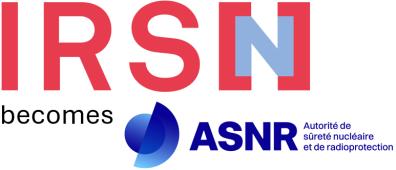Signing of a memorandum of understanding to strengthen IRSN's cooperation with its Ukrainian counterpart SSTC NRS
This week, from September 11 to 14, 2023, IRSN, along with the representative of our embassy in Kyiv, received a visit from Director Ihor Shevchenko of the State Scientific and Technical Centre for Nuclear and Radiological Safety (SSTC NRS), the equivalent of IRSN and a Ukrainian partner. During this visit, Ihor Shevchenko and Jean-Christophe Niel signed a memorandum of understanding between IRSN and SSTC NRS and discussed the technical areas for continuing their exchanges.
Discussions on the areas proposed by SSTC NRS or IRSN first took place in Fontenay-aux-Roses, with the Safety Expertise Department and the Pollution and Radioactive Waste Department in particular. The visit to the technical crisis centre provided an opportunity for more detailed discussions on emergency situations and assessing the consequences of an accident. The visit to Cadarache will provide an opportunity to discuss the ASTEC code with PSN-RES and to examine the conditions under which IRSN and SSTC NRS can work together in this field. The issue of the safety of small modular reactors will be the subject of a discussion on the PASTIS platform project.
In addition to ongoing exchanges between IRSN and the SSTC NRS, IRSN is also contributing to assistance to Ukraine as part of the European INSC instrument. This involves working with European partners to help Ukraine improve nuclear safety and radiation protection in line with international and European standards. IRSN (at the head of a consortium) has been tasked by the European Union with continuing these efforts for the period 2023-2026.
SSTC NRS is also active in ETSON, the European TSO network, of which it has been an associate member since 2010.
Ihor Shevchenko thanked "France and IRSN for their support since the 1er day of the large-scale attack, which helped to preserve the operation of their safety organization and was delighted that the signing of the MOU will further strengthen our cooperation in the future".
Jean-Christophe Niel said he was "pleased to welcome Ihor and the SSTC delegation to IRSN and to strengthen our exchanges in many areas" and "impressed by the courage shown by the Ukrainian people in opposing the brutal war of aggression to which Ukraine is a victim".
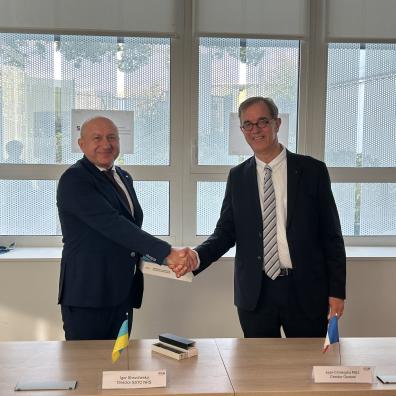
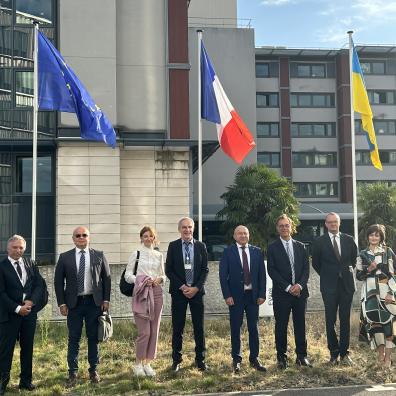
Find out more
The IAEA once again recognizes the quality of IRSN's expertise
In March 2023, Rafael Mariano Grossi, Director General of the IAEA, renewed the appointment of Jean-Christophe Niel as a member of the International Nuclear Safety Advisory Group (INSAG) representing France until July 2026.
On August 24, 2023, Louis-Michel Guillaume, Deputy Director General of IRSN, delegated for Defense-related missions, was renewed as a member of the Advisory Group on Nuclear Safety (AdSec) for a three-year term. He has been a member since 2018.
The presence of the Institute's managers in these two structures bears witness to the Agency's recognition of the quality of its expertise.
To know more about these committees
INSAG and AdSec are groups of experts with high levels of professional competence in the respective fields of nuclear security and of nuclear and radiation safety. Both expert groups are convened by the IAEA with the objective of providing authoritative advice and recommendations on current and emerging issues of nuclear safety and security to the IAEA’s Director General.
INSAG addresses fundamental safety issues, as well as current and emerging matters of importance relevant to the nuclear and radiation safety of all facilities and activities using nuclear or radioactive material.Specifically, AdSec advises on the IAEA’s current and proposed activities in the area of nuclear security. It makes recommendations on measures aimed at strengthening the Agency’s role and activities and provides guidance on priorities regarding these activities in the area of nuclear security.
IRSN certified by the Polish Nuclear Safety Authority
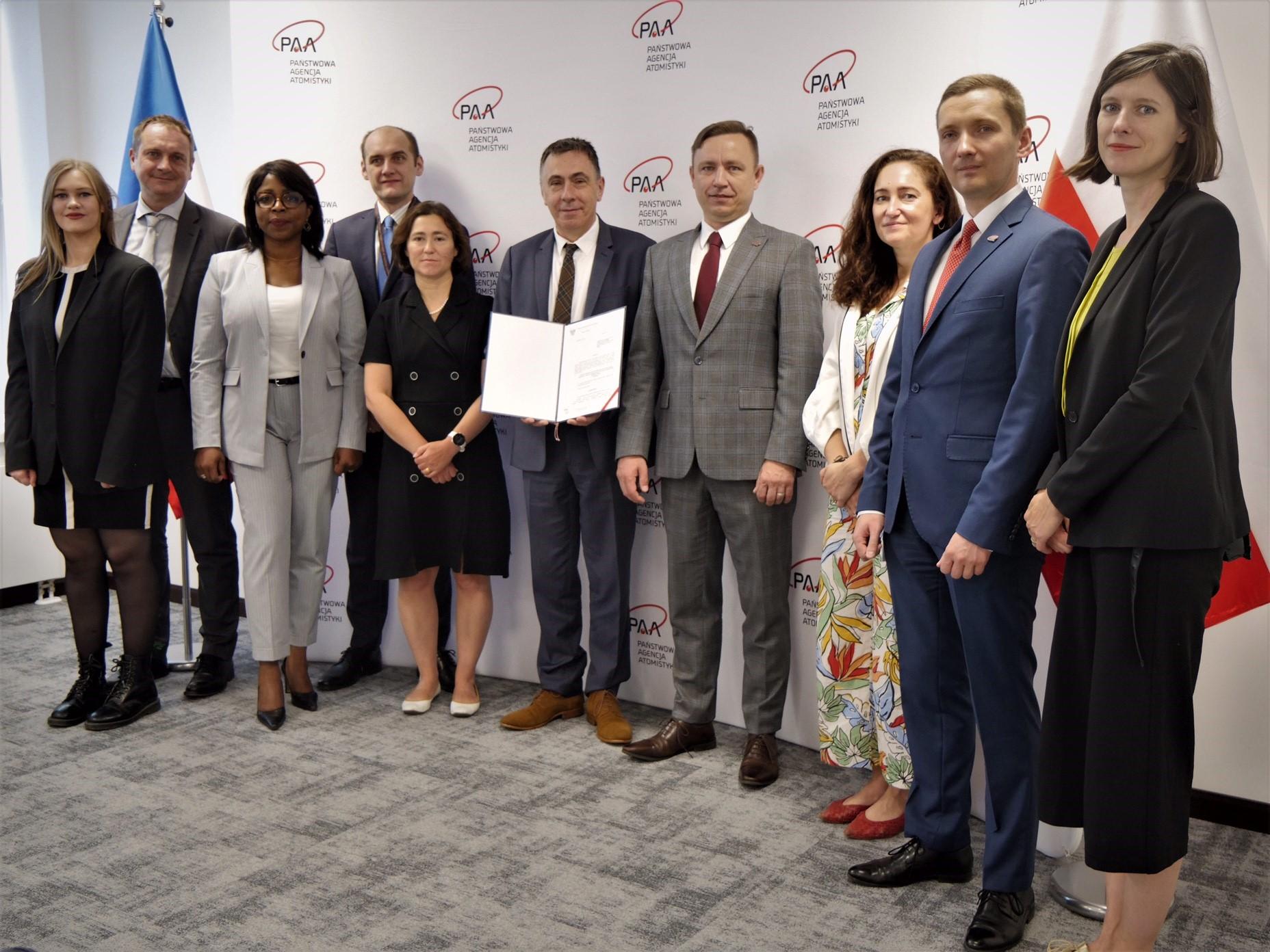
As part of the strengthening of IRSN's partnership with the Polish Nuclear Safety Authority (PAA), IRSN Strategy Director Patrice Bueso travelled to Warsaw on July 11, 2023, to officially sign the Institute's recent certification with the PAA.
The signing of this certification document will enable the Institute to be consulted by the PAA as technical and scientific support, to assess the safety of future nuclear facilities in Poland. This referral is the result of numerous constructive exchanges between IRSN and PAA over recent months.
In July 2022, the Institute's Director General received a delegation from the PAA to identify the Polish authority's needs in terms of examining future projects that may be submitted to it as part of the roll -out of Poland's nuclear program. Continued discussions in the months that followed led to the drafting of a Memorandum of Understanding and the preparation of IRSN's certification dossier, making it the first foreign organization to be certified by the PAA.
This major event was celebrated in the presence of the Chargé d'Affaires of the French Embassy, Lucie STEPANYAN, and the President of PAA, Mr Andrzej GLOWACKI.
Jean-Christophe Niel elected President of ETSON, the European TSO network
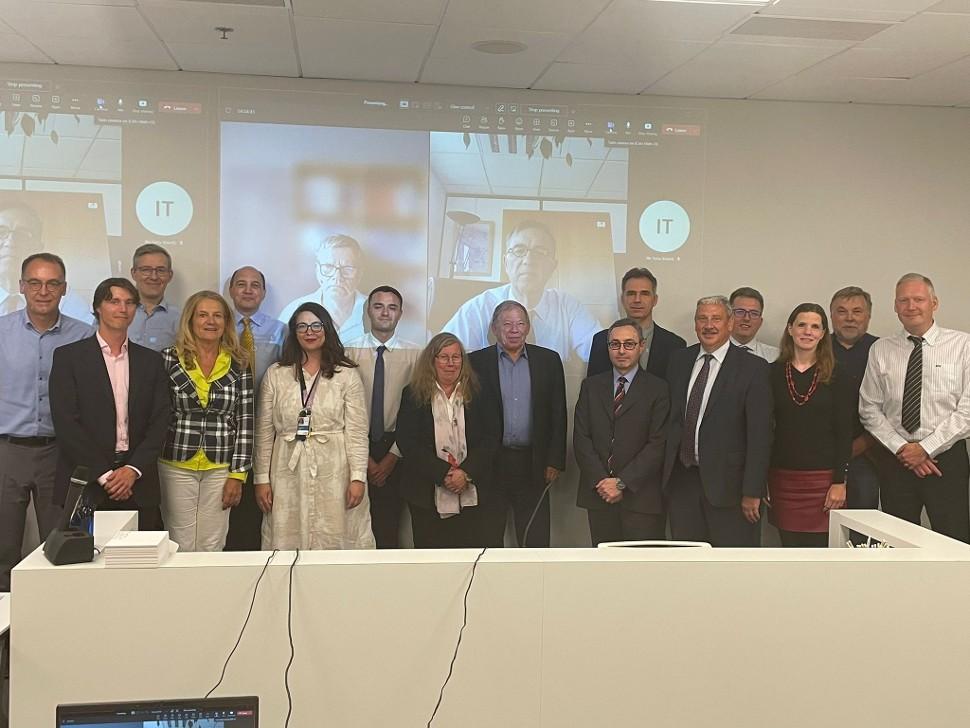
The European Technical Safety Organisations Network, ETSON (Etson.eu) held its general meeting on June 14, 2023, and elected Jen-Christophe Niel, Director General of IRSN, as Chairman for a 3-year term.
ETSON's 12 EU members, along with the UK, Japan and Ukraine, have entrusted their new President with the responsibility of continuing ETSON's commitment to nuclear safety, safety authorities, other nuclear industry players and European citizens. The President will have to promote the association's values of exchange, transparency and scientific excellence, as well as strengthening its action in dedicated nuclear safety research, in support of technical expertise, to meet tomorrow's safety challenges.
Jean-Christophe Niel thanked his peers for their support and confidence, and in particular highlighted his priorities in terms of training young generations of experts and strengthening ETSON's cooperation with international organizations (European Commission, IAEA, OECD/NEA) and networks of safety authorities, such as WENRA (Wenra.eu) and ENSREG (ensreg.eu).
Jean-Christophe Niel succeeds Uwe Stoll, Managing Director of GRS, the German TSO, who assumed these responsibilities for 6 years.
The 5th test in the international CABRI (CIP) program is successful
Led by IRSN, the international CABRI (CIP) program, under the supervision of the OECD Nuclear Energy Agency, studies the behavior of nuclear fuel rods in pressurized water reactors during an accidental power excursion transient.
This test, carried out by IRSN and CEA teams on April 24, 2023, and named CIP3-3, was the fifth test in the CIP program conducted in the CABRI facility, and the third in a "water loop" configuration, representative of the thermal-hydraulic conditions of a pressurized water reactor (PWR). The fuel rod consisted of UO2 fuel and an Optimized ZIRLO cladding: a first for the CABRI facility. The simulation was carried out using a neutron pulse lasting around ten milliseconds and with a power of 13 GigaWatt.
The purpose was to study the behavior of this type of cladding, and to investigate the reaching of the boiling crisis, in an accident situation such as reactivity injection.
The rod will now be analyzed by IRSN at a dedicated station (IRIS) in the CABRI reactor hall, before being transferred at the end of the year to CEA's active fuel examination laboratory (LECA), where it will first undergo non-destructive and then destructive analysis. This, combined with the on-line measurements acquired during the pulse, will enable the most complete possible interpretation of the test.
